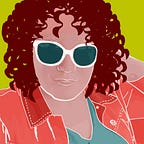Drag was, in fact, created by trans women of color and continues to be an art form that features tons of trans and nonbinary performers. By virtue of there simply being more cis people in existence, more of them do drag, but they often learn of their craft from trans performers in their communities, A lot of trans people find their identity through drag and continue doing drag after coming out, and some trans people even start doing drag after coming out because it's a performance art that is particularly accessible to trans people.
What you describe, however, does remind me of the depiction of characters like Noxeema, Vida, and Chi-Chi in To Wong Foo. These characters are described as drag queens despite being in "drag" 100% of the time. That is not exactly a typical “drag queen” experience. Ultimately, the characters were definitely trans, but the movie is a product of its time. Jerod Leto’s depiction of “Rayon” in Dallas Buyer’s Club has a similar problem, given that the actor has absolutely no relevant experience to lean on in his depiction a trans woman. Basically, where trans people aren’t involved in the formation or depiction of a trans character, those characters become largely unrelatable to the demographic they’re trying to depict.
Cis people often conflate transness with drag, but there is a pretty significant crossover. That is to say, drag and trans are not mutually exclusive.
RuPaul’s Drag Race has, in fact, been host to no less than ten out trans people, and even crowned a trans woman as winner on the sixth season of Drag Race All Stars. Many more trans people have come out after their time on the show and continue to do drag, and none of this includes the multitude of nonbinary performers who have been on the show.
Your issue with this characterization is quite valid and there is definitely problematic conflation of drag and transness in the work you read, but I think your description of drag here lacks a bit of nuance.
--
With all of that said, I think that cishet people writing from a queer perspective is definitely iffy. Writing a queer character is one thing, but trying to accurately depict an experience you don't have access to very often leads to narrative issues and flat or straight up offensive characterizations.
This issue is also present when able-bodied people write from a disabled perspective, white people try to write from the perspective of Black and Indigenous People of Color, etc etc. There are lots of movies out there with hugely problematic depictions of marginalized people, and most of that stems from marginalized people not being in the writer’s room to lend a sense of realness to a given characterization.
—
Thank you for your piece here - it was definitely thought provoking!
